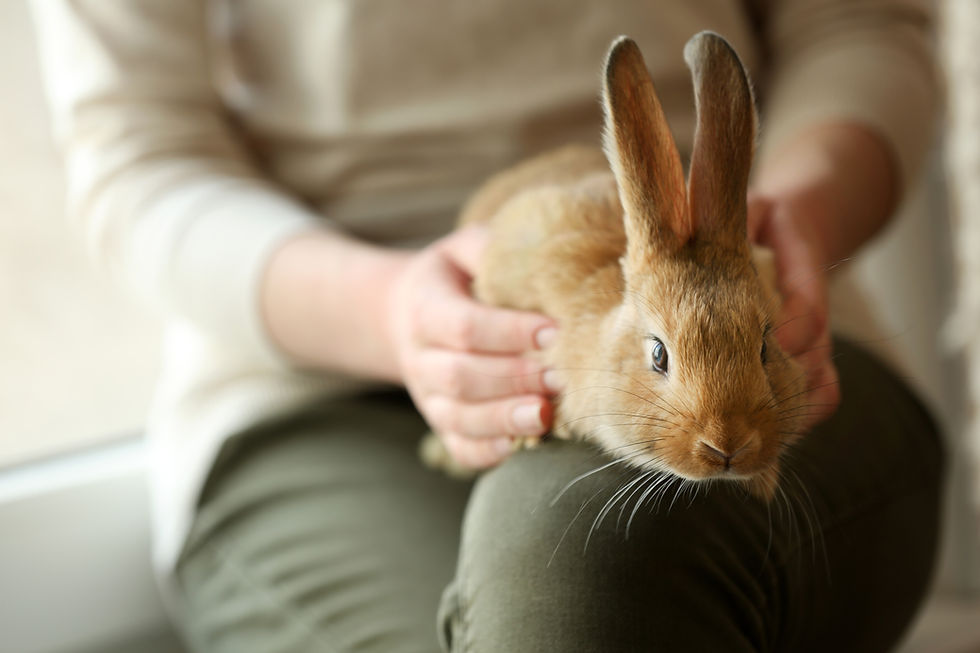
Covid season is back in Malaysia, and the Ministry of Health's statistics backs it. With an increase of 29%1 from the previous week to 22,413 cases, it’s no surprise that my colleagues are catching the virus-like flies. And I am one of the latest casualties.
Living in a multi-generational household where the eldest is 90 years old and the youngest is still in elementary school, a good isolation plan is important to contain the spread.
So, I upped and isolated to another venue, along with my pet rabbit.
Was this a wise decision? As the primary litter box cleaner and food provider, I felt this was the only option.
Here are some burning questions I had about how to manage rabbit care while sick with Covid-19.
Can you pass Covid to your rabbit?

According to rabbit.org, there are no documented cases of rabbits being infected with Covid-19 outside of a laboratory environment.
Similarly, both domestic and wild rabbits have not been found to be infected with Covid-19 outside of laboratory conditions
Can rabbits and other household pets get Covid?
According to news-medical.net, some pets can contract Covid-19 through close contact with infected humans.
According to tests in Wuhan, among the serum samples taken from 102 cats 15 of the samples were found to have COVID-19 antibodies.
Nevertheless, while animals are susceptible to infection, they may not develop symptoms or can be contagious to humans.
Dogs can become infected through close contact with their owners. Although this is rare, infected dogs show mild or no symptoms. Dogs cannot transmit the infection further.
As for rabbits, they can become infected, and rabbits show no symptoms. Rabbits are also unable to transmit the virus to other rabbits or other species.
Cats can contract COVID-19 from infected owners. However, cats only display mild symptoms or none at all. An infected cat can spread COVID-19 to other cats, but there is no evidence that they can transmit the virus back to humans.
In short, general household pets are not capable of transmitting Covid-19 to humans.
Other animal species that have been reported to be infected with COVID-19 include tigers, lions, ferrets, hamsters, mice, and minks.
As for farm animals, according to Ulrch et al., cattle have a strong resistance towards SARs Covid-2 infection and were not easily infected. The situation is similar for pigs and other poultry species such as turkey, chicken, ducks, geese and Japanese quill as they are not susceptible to Covid-19.
The same report also noted that rabbits and guinea pigs who were housed with Covid patients tested negative for Covid-19.
While I did not subject my rabbit to any COVID-19 test as it is not available in vet offices in Malaysia, I can attest that my Netherland Dwarf displayed no symptoms.
What is the CDC’s Stance on Pet Animals and COVID-19?
The CDC recommends that you restrict contact with pet animals if you have tested positive for Covid-19 or suspect to have contracted the virus. If someone else is unable to render care for your pet rabbit while you recuperate, wear a mask when you care for animals.
To date, there have been no documented cases of a rabbit infected with COVID-19, either wild or domestic outside of laboratory conditions.
How do I care for my pet rabbit while under quarantine for Covid?

Before I touch my rabbit, I would put on a face mask. Then I wash my hands up to the elbows with antibacterial soap and wipe them dry or let them air dry before feeding, petting, or cleaning my rabbit's enclosure.
Although this may seem counterproductive as rabbits are sociable animals, I try to minimize talking to him during the first 3 days. Given the recurring high fevers and blistering painful throat, hopefully, this will help to minimize the release of droplets into the air.
However, this is not a scientifically proven precaution. But one that I have adopted out of comfort.
I also keep my distance from my rabbit and refrain from sniffing him. As much as I like his little paws on me, I have forbidden him from jumping on my belly for treats.
Being a creature of habit, I try to stick to the same feeding schedule as I do at home. I maintain the same nightly enrichment routine by hiding his treats in toy stacking cups and balls.
I'm grateful that my rabbit emerged unscathed from isolation with me, with no signs of lethargy, breathing difficulties, fever, or runny nose!
Conclusion
After testing negative on day 5 and living with my rabbit in an 800sq ft. SOHO condominium for 8 days, I realized that he hates to see me sleep. He has developed a habit of biting at his enclosure from 6 am onwards, and this can go on intermittently until 7 am.
I'm not sure if it’s raging hormones that are causing my beloved 8-month-old rabbit to become a madman! Or just pure boredom from watching the "hooman" not doing anything to entertain him.
Now that we're back home, he seems calmer as we move him from room to room throughout the day. It breaks up the monotony of being in the same place all day.
I'm glad that we have broken the Covid-19 infectious cycle. Let’s stay vigilant against this virus that does dampen our daily routine.
In the meantime, put on a mask, maintain personal hygiene and social distancing!
Resources
1 Freemalaysiatoday.com, 23 December 2023
Comments